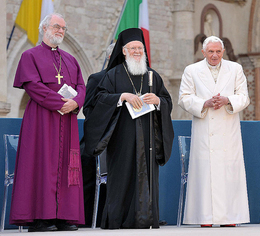Archbishop's Ecumenical Letter to Churches
 The Archbishop in Assisi with Ecumenical Patriarch Bartholomew I and Pope Benedict XVI. Photo: © news.va
The Archbishop in Assisi with Ecumenical Patriarch Bartholomew I and Pope Benedict XVI. Photo: © news.vaWednesday 7th December 2011
In his ecumenical Christmas Letter to the heads of other Churches and Christian world communions, the Archbishop of Canterbury urges Christian leaders to overcome suspicion and fear by recognising 'the kinship between all who have come to know how vulnerable they are and how insecure their world is'.Dr Williams says in his letter that 'whatever stories we tell ourselves, whatever strategies we develop for keeping ourselves safe, the truth is always that being human is being subject to change and to the risk of suffering.'
'Solidarity must now find expression in humility and generosity, and in the search for true justice for all.'
The full text of the Archbishop's letter follows.
Dear Friends
‘Before long I will shake heaven and earth, land and sea.
I will overthrow all the nations.’ (Haggai 2.6-7)
Over the past twelve months, many will have sensed that this is indeed a time of the ‘shaking of nations’. The tumultuous events in the Middle East and North Africa, the economic crisis in Europe and indeed in North America too – all this has reminded us of how fragile are some of the structures we take for granted. Our political identities and our financial security alike are vulnerable. We have no choice but to ask what it is that cannot be shaken. But as we do, we should also reflect on a phrase that has been used by some writers and thinkers in recent years: we are called to experience ‘the solidarity of the shaken’ – that is, we are called to recognize the kinship between all who have come to know how vulnerable they are and how insecure their world is. To recognize the same vulnerability in each other is a very profound solidarity, one that overcomes much of our suspicion and fear.
And it tells us that what does not change is the human condition itself. Whatever stories we tell ourselves, whatever strategies we develop for keeping ourselves safe, the truth is always that being human is being subject to change and to the risk of suffering. Paradoxically, what does not change about us is our fragility. If the heavens and the earth, the sea and the dry land and all nations are ‘shaken’, what comes into focus as the abiding truth is our need, our poverty.
The Christmas gospel is not a social programme; but it does contain a judgement upon all who imagine that their wealth and power removes them from the common human destiny. It teaches them that they are already in solidarity with the poorest, even though they do not recognize the fact; and it tells them that this solidarity must now find expression in humility and generosity, and in the search for true justice for all.
And the Christmas gospel does this simply by pointing us again to the greatest fact of human history: God’s coming among us in the form of a helpless child. What is to be truly human? The sages and politicians of the ancient world would have seen true humanity in the beauty and rationality of human beings, in their liberty from constraints. The gospel tells us to look to the poor child of Bethlehem as the true human being. If we want to know what is most basic and what never changes, it is to be seen in our weakness, in the fact that we are born in need of the love and care of others. The more we forget that, the further we go from real human dignity. The more we remember it, the more we enter into real freedom, Godlike freedom, the freedom to give and receive love.
‘You know the grace of our Lord Jesus Christ; rich as he was, he made himself poor for your sake, in order to make you rich by his poverty’ (II Cor., 8.9). To believe this is to be established on a foundation that cannot be shaken, a foundation on which we may build our hopes and our actions of justice and compassion. May God through Christ build us afresh upon this foundation alone.
With my love and my prayers for this Season
to all who share in the care of Christ’s Church
for which he shed his precious blood.
+Rowan Cantuar:
From Lambeth Palace, London
St Ambrose, 7 December 2011
